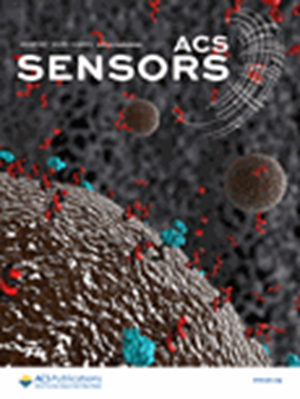Sustainable Electrochemical-Magnetic Biosensor Fabricated from Recycled Materials for Label-Free Detection of SARS-CoV-2 in Human Saliva
IF 9.1
1区 化学
Q1 CHEMISTRY, ANALYTICAL
引用次数: 0
Abstract
The COVID-19 pandemic has highlighted the critical need for scalable, rapid, and cost-effective diagnostic solutions, especially in resource-limited settings. In this study, we developed a sustainable magnetic electrochemical biosensor for the mass testing of SARS-CoV-2, emphasizing affordability, environmental impact reduction, and clinical applicability. By leveraging recycled materials from spent batteries and plastics, we achieved a circular economy-based fabrication process with a recyclability rate of 98.5%. The biosensor employs MnFe2O4 nanoparticles functionalized with anti-SARS-CoV-2 antibodies, integrated into a 3D-printed electrochemical device for decentralized testing. Advanced characterization confirmed the biosensor’s robust performance, including high sensitivity (LOD: 3.46 pg mL–1) and specificity, with results demonstrating a 95% correlation to RT-PCR gold standard testing. The cost of materials used per biosensor test is only USD 0.2, making it highly affordable and suitable for large-scale production using additive manufacturing. Key features include simple preparation, rapid response, and reusability, making it ideal for point-of-care diagnostics. Beyond COVID-19, this platform’s modularity allows for adaptation to other viral diseases, offering a versatile solution to global diagnostic challenges. This work highlights the potential of integrating electrochemical sensing with sustainable practices to address healthcare inequities and reduce environmental impact.

回收材料制备的可持续电化学-磁性生物传感器用于人唾液中SARS-CoV-2的无标记检测
COVID-19大流行凸显了对可扩展、快速和具有成本效益的诊断解决方案的迫切需求,特别是在资源有限的情况下。在本研究中,我们开发了一种可持续的磁性电化学生物传感器,用于SARS-CoV-2的大规模检测,强调可负担性,减少环境影响和临床适用性。通过利用废旧电池和塑料中的回收材料,我们实现了以循环经济为基础的制造工艺,回收率为98.5%。该生物传感器采用具有抗sars - cov -2抗体功能化的MnFe2O4纳米颗粒,集成到3d打印电化学装置中进行分散测试。高级表征证实了该生物传感器的强大性能,包括高灵敏度(LOD: 3.46 pg mL-1)和特异性,结果显示与RT-PCR金标准测试的相关性为95%。每个生物传感器测试使用的材料成本仅为0.2美元,这使得它非常经济实惠,适合使用增材制造进行大规模生产。主要特点包括制备简单,反应迅速和可重用性,使其成为护理点诊断的理想选择。除了COVID-19之外,该平台的模块化还允许适应其他病毒性疾病,为应对全球诊断挑战提供多功能解决方案。这项工作强调了将电化学传感与可持续实践相结合的潜力,以解决医疗保健不平等问题并减少对环境的影响。
本文章由计算机程序翻译,如有差异,请以英文原文为准。
求助全文
约1分钟内获得全文
求助全文
来源期刊

ACS Sensors
Chemical Engineering-Bioengineering
CiteScore
14.50
自引率
3.40%
发文量
372
期刊介绍:
ACS Sensors is a peer-reviewed research journal that focuses on the dissemination of new and original knowledge in the field of sensor science, particularly those that selectively sense chemical or biological species or processes. The journal covers a broad range of topics, including but not limited to biosensors, chemical sensors, gas sensors, intracellular sensors, single molecule sensors, cell chips, and microfluidic devices. It aims to publish articles that address conceptual advances in sensing technology applicable to various types of analytes or application papers that report on the use of existing sensing concepts in new ways or for new analytes.
 求助内容:
求助内容: 应助结果提醒方式:
应助结果提醒方式:


